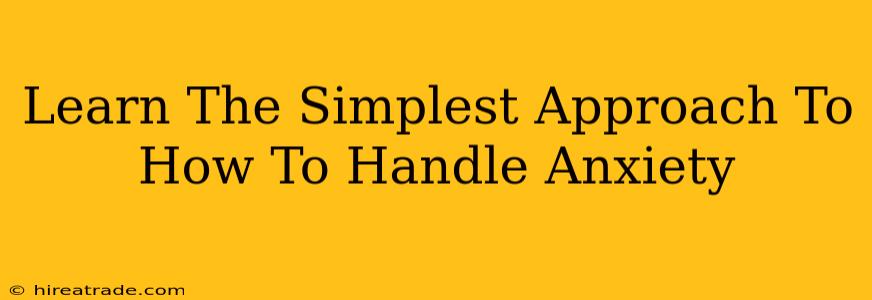Anxiety. That nagging feeling of unease, that knot in your stomach, the racing heart. It's something so many of us experience, and it can feel utterly overwhelming. But what if I told you there's a simpler approach to handling anxiety than you might think? It's not about magically erasing it, but about learning to manage it, to navigate those challenging moments with grace and resilience.
Understanding Your Anxiety: The First Step
Before diving into coping mechanisms, it's crucial to understand your anxiety. What triggers it? Is it related to specific situations, people, or thoughts? Keeping a journal can be incredibly helpful. Note down when you feel anxious, what was happening, and the physical sensations you experienced. This self-awareness is the bedrock of effective anxiety management.
Identifying Your Triggers:
Think about the situations that tend to make you feel anxious. Is it public speaking? Social gatherings? Work deadlines? Identifying these triggers allows you to proactively prepare and implement coping strategies.
Recognizing Physical Symptoms:
Anxiety often manifests physically. This might include shortness of breath, muscle tension, trembling, or a racing heart. Recognizing these symptoms is vital, as it allows you to identify the onset of anxiety and take action before it escalates.
Simple, Yet Powerful Techniques to Manage Anxiety
Once you've gained a better understanding of your anxiety, you can begin implementing effective coping strategies. These aren't quick fixes, but rather tools you can build into your daily life to foster a greater sense of calm and control.
1. Deep Breathing Exercises: The Instant Calming Effect
Deep, slow breaths are your immediate first-aid kit for anxiety. When you feel overwhelmed, try this:
- Inhale slowly through your nose, counting to four.
- Hold your breath for a count of two.
- Exhale slowly through your mouth, counting to six.
- Repeat this several times.
This simple exercise can help slow your heart rate and calm your nervous system.
2. Mindfulness and Meditation: Finding Your Center
Mindfulness encourages you to focus on the present moment, without judgment. Even five minutes of daily meditation can make a significant difference. There are many guided meditations available online or through apps, making it easier than ever to get started. The key is to focus on your breath and gently redirect your attention when your mind wanders.
3. Progressive Muscle Relaxation: Releasing Tension
Progressive muscle relaxation involves systematically tensing and releasing different muscle groups in your body. This helps release physical tension, which often accompanies anxiety. Start with your toes, tensing them for a few seconds, then releasing. Work your way up your body, focusing on each muscle group.
4. Regular Exercise: Boosting Your Mood Naturally
Physical activity is a powerful mood booster. Exercise releases endorphins, which have mood-lifting effects. Find an activity you enjoy, whether it's running, swimming, yoga, or dancing. Even a short walk can make a difference.
5. Prioritize Sleep: Rest and Recharge
Sufficient sleep is essential for both physical and mental health. Aim for 7-9 hours of quality sleep each night. Establish a relaxing bedtime routine to help you unwind before sleep.
When to Seek Professional Help
While these simple techniques can be incredibly helpful, it's important to remember that seeking professional help is a sign of strength, not weakness. If your anxiety is significantly impacting your daily life, consider talking to a therapist or counselor. They can provide personalized support and guidance to help you manage your anxiety effectively.
Remember, managing anxiety is a journey, not a destination. Be patient with yourself, celebrate your progress, and don't hesitate to reach out for support when you need it. You're not alone, and there's hope for a calmer, more peaceful you.

